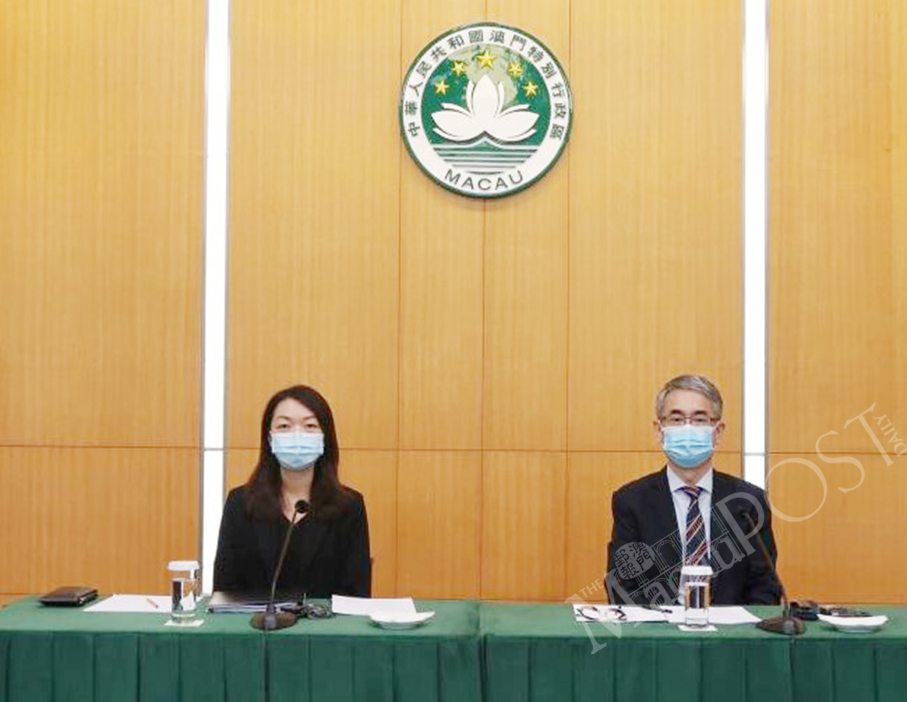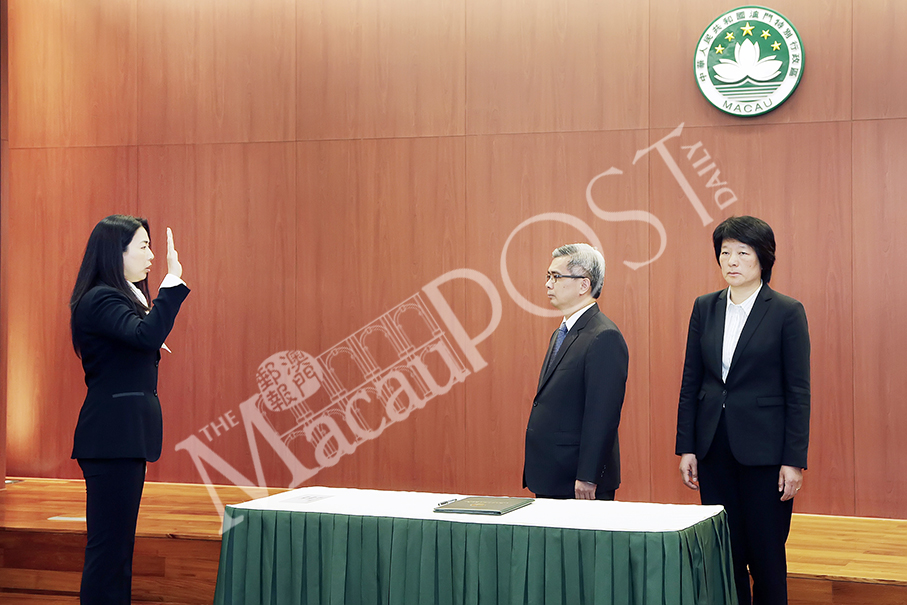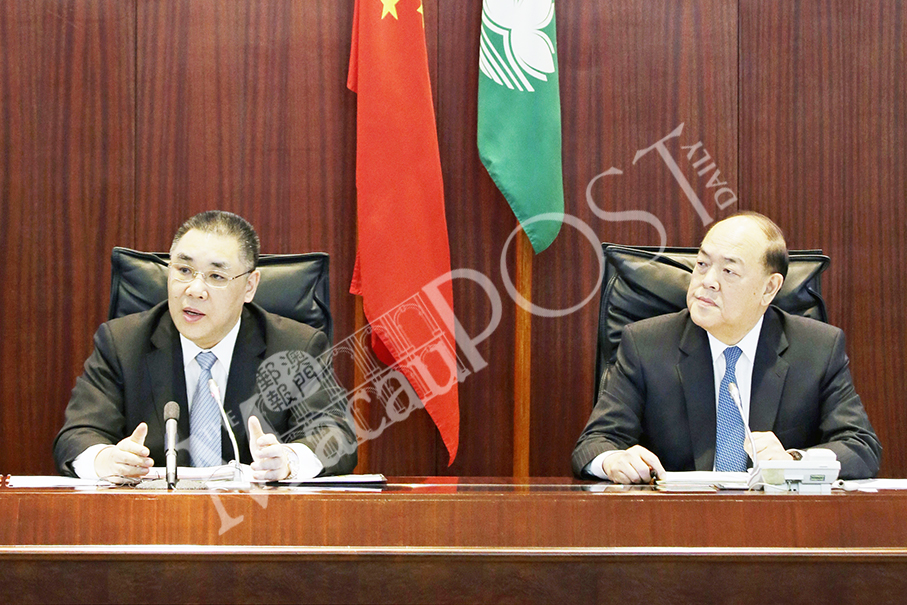Secretary for Administration and Justice André Cheong Weng Chon, who is also the spokesman for the government’s top advisory Executive Council, has announced that the government has finished drafting a bill that proposes to establish a compulsory arbitration system to deal with disputes over water leakages in buildings.
According to Cheong, the bill proposes that households affected by water leaks can initiate arbitration, and arbitrators’ decisions will make it compulsory for owners of flats suspected of having caused the leaks to allow professionals to enter their flats for assessment.
Cheong made the announcement during a press conference at Government Headquarters on Friday. The bill will be submitted to the Legislative Assembly (AL) in due course for debate, review and vote.
Cheong acknowledged that the occurrence of buildings’ water leaks in the city has been “bothering” residents for years.
Cross-departmental centre
Cheong underlined that most cases of water leakages in Macau have been resolved through “negotiations between neighbours”. However, Cheong said, if flats suspected of having caused water leaks are unoccupied, or if their owners “refuse to cooperate”, residents affected by water leakages will have no choice but to resort to judicial proceedings, which, Cheong said, do “undoubtedly” cause the affected households more “distress”.
Consequently, Cheong noted, the Macau government established a cross-departmental centre in 2009 that aims to help affected households solve cases of buildings’ water leaks. Cheong pointed out that the centre aims to facilitate negotiations between households affected by water leakages and owners of flats that have caused the leaks with the objective of solving the predicament, to provide assistance in detecting and identifying the sources of water leakages, and to promote the necessary repairs to be carried out by the owners of flats that have caused the leaks.
The centre, officially known as the Centre for the Joint Treatment of Water Leakages in Buildings, is run by the Housing Bureau (IH) in collaboration with the Lands and Urban Construction Bureau (DSSCU), the Municipal Affairs Bureau (IAM), the Health Bureau (SSM), and the Legal Affairs Bureau (DSAJ).
Cheong underlined that according to official statistics, most of the requests for assistance from the centre have been able to be resolved through the centre’s coordination since its inception.
3 difficulties
However, Cheong said, the centre has still been unable to solve some cases, adding that the government has concluded that the predicament is being caused by three major difficulties, namely difficulties in entering flats suspected of having caused water leakages for assessment, difficulties in hiring professionals to detect the causes of the leaks, and difficulties in getting paid for the repair costs by the owners of the flats that have caused the leakages.
Consequently, Cheong said, the government has decided to draft the bill, officially known as Compulsory Arbitration System for Disputes over Water Leakages in Buildings, with the aim of “contributing to the resolution of the three difficulties through the establishment of a new legal system”.
Cheong noted that under the current system on the operation of the Centre for the Joint Treatment of Water Leakages in Buildings, only one testing institution, the Civil Engineering Laboratory of Macau (LECM), is hired by the government for assessment to identify the sources of water leaks, because of which, Cheong said, households that have made a request for assistance from the centre will normally need to wait for nine months before the laboratory can assess the situation in the flats concerned.
Cheong said that with the aim of alleviating the current burden imposed on the testing institution tasked with detecting buildings’ water leakages and solving the long waiting time, the bill proposes that households affected by water leaks can hire other officially licensed testing institutions or professionals in the city to assess the water leakages. The bill proposes that an assessment report compiled by the respective testing institution or professional can be used for arbitration in case the households affected by water leaks decides to initiate arbitration.
Cheong added that the bill proposes that officially licensed civil engineers or respective companies will be eligible to carry out assessment of water leakages in buildings and then issue the respective assessment report that can be used for arbitration. According to official statistics, there are currently around 2,000 officially licensed civil engineers in Macau.
Modus operandi
Cheong said that with the aim of solving the current difficulties in entering flats suspected of having caused water leakages, the bill proposes the establishment of a compulsory arbitration system for dealing with disputes over water leaks in buildings.
Cheong said that according to the proposed compulsory arbitration system, if a report by the respective testing institution or professional hired by household to assess the water leakages in their buildings has concluded that it is necessary to enter a flat suspected of having caused the leaks to carry out follow-up assessment with the objective of identifying and confirming the sources of the leakages, the respective flat owner is obliged to allow such entry.
According to Cheong, the bill proposes that if the flat owner still refuses to cooperate, the households affected by the leakage can then initiate a compulsory arbitration process with an arbitration institution that will be established for dealing with disputes over water leaks, with the submission of the assessment report compiled by the respective testing institution or professional.
The bill proposes that if the future arbitration institution determines that the respective flat owner is required to allow entry for leakage assessment purposes, it is legally mandatory for them to comply with such a requirement.
According to Cheong, the bill proposes that a decision by the arbitration institution will have the same “enforceability” as a judgement by the Court of First Instance (TJB), according to which, Cheong said, if the respective flat owner still refuses to comply with a decision by the arbitration institution that requires him or her to allow entry into his or her flat, the decision will be enforced by the court, and if necessary, even by police officers.
Furthermore, Cheong said that with the aim of solving the current difficulties in recovering repair costs from owners of flats that have caused water leaks, the bill suggests that the proposed system will also cover arbitration for dealing with disputes over repair costs as well as compensation for property damage resulting from the leakages.

Secretary for Administration and Justice André Cheong Weng Chon (right) and Leong Weng In, a deputy director of the Legal Affairs Bureau (DSAJ), address Friday’s Executive Council press conference at Government Headquarters. Cheong headed the bureau from 2000 to 2014. – Photo courtesy of TDM









